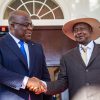Tanzania is expressing reservations about fully embracing the operationalization of the East African Community (EAC) Single Tourist Visa (STV), bringing attention to unresolved concerns regarding security, financial implications, and the overall efficacy of the scheme.
The STV plan, already initiated by Kenya, Uganda, and Rwanda, has been met with contentment by these nations. However, Tanzania contends that the existing framework lacks EAC-wide standards. Officials from Dodoma raised pressing issues, including security measures, revenue-sharing mechanisms, and the effectiveness of the proposed single visa system for visitor screening.
Despite the hesitancy from Tanzania, the EAC Council, in a meeting chaired by Burundi’s Minister for Environment, Prosper Dodiko, has resolved to seek consensus on the STV before its planned implementation in the coming year. This decision emphasizes the importance of cooperation among partner states in tourism promotion and wildlife resource management.
Deputy Minister for Foreign Affairs and East African Cooperation in Tanzania, Stephen Byabato, stressed the need for immigration departments, rather than tourism dockets, to oversee visa applications. He proposed conducting a new study on the region’s readiness for a unified visa, a proposition contested by Uganda, arguing it would consume additional time and resources.
To address the concerns surrounding the Single Tourist Visa, the Sectoral Council proposed the coordination of an updated study by June 2024, with a framework for implementation set to be developed by December 31, 2024.
The initiative to establish a Single Tourist Visa originated from a directive set by the 11th Council of Ministers in Arusha in November 2006, highlighting the importance of the tourism sector to the EAC economy. Despite the recovery trajectory observed post-Covid-19, concerns persist regarding the visa application process and its potential impact on boosting international tourist arrivals in the region.
The EAC aims to leverage investment opportunities in tourism, including resort city development, premium park branding, and promoting health and sports tourism, among other initiatives.
As the region navigates these considerations, the spotlight remains on the importance of the Single Tourist Visa in fostering regional cooperation, boosting economic growth through tourism, and creating a streamlined process for international visitors.















